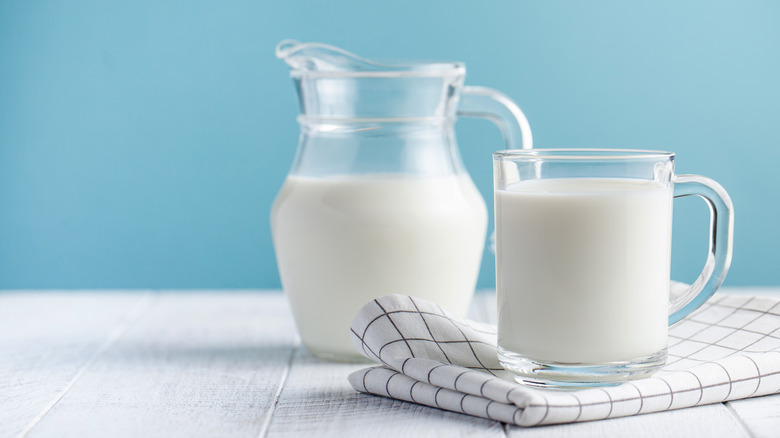Is It Helpful To Drink Milk When You're Dehydrated?
Milk might be your go-to choice when you're pouring a bowl of cereal or looking for a creamy addition to your morning coffee. But what about when you're dehydrated? While sports drinks and water are usual solutions to rehydrating, cow's milk might also be a good option, according to Healthline.
If you're feeling thirsty, you're probably already dehydrated (via Cleveland Clinic). This means you might not have drunk enough fluids or may have lost too much fluids as a result of sweating or vomiting. Dehydration symptoms can include headaches, dizziness, fatigue, constipation, high heart rate, and low blood pressure. It can even make you feel confused or anxious.
If you think you're dehydrated, you need to replace fluids as well as electrolytes (via Medical News Today). Electrolytes are minerals in the body, such as sodium, calcium, magnesium, potassium, and phosphate. They need to be replaced since they help to balance water levels, remove waste, push nutrients into cells, send signals out from nerves, and help our muscles to work properly. While rehydration drinks like Gatorade are popular, there may be other good options out there, like milk.
How milk can hydrate you – and keep you hydrated
Cow's milk naturally contains electrolytes like sodium, potassium, and calcium, according to Harvard Health Publishing. It's also very hydrating, as it's made up of about 87% water. The rest of milk contains important nutrients like fat, carbohydrates, protein, vitamins, and other minerals.
Since water contains minimal minerals and nutrients, it's good for hydrating but doesn't necessarily keep you hydrated for long (via Real Simple). Milk, on the other hand, has been shown to help the body absorb water and retain it for longer. A 2015 study published in The American Journal of Clinical Nutrition found that after drinking milk, participants had a smaller urine output than after drinking water, meaning that hydration from milk was kept in the body for a longer period of time. It also showed that milk was better at preventing dehydration than water. While a cold glass of milk might not be the first thing you reach for after a vigorous workout, it could help your body recover more than taking a swig from your water bottle.
For those who avoid milk and lactose, non-dairy milk could be an option — but it may not be as effective (via Real Simple). Milk alternatives are high in water content, but don't contain the same nutrients as cow's milk. While they're often nutritionally fortified, they still don't come close to the nutritional properties of milk.


